Nearly a month after being arrested, interrogated, and processed for sharing God’s Word among China’s truly unreached, and refusing to turn in my teammates (enabling them to escape), my deportation day had finally come.
Waving Goodbye
The police had told me to be ready by 4pm (to catch a 6pm train), so I had most of the day to prepare. Unfortunately, my memories of the first half of that day are pretty spotty. In fact, I had to pull out an old calendar just to remind myself of anything I did that day prior to the police coming for me.
So it turns out that after having lunch at home together as a family, I took the kids to their weekly soccer practice across town, where I said goodbye to them for a few weeks. Quickly returning home, I showered and made my final preparations for departure, double-checking my packing list for anything I couldn’t leave behind. When the police called to say had arrived, my wife and I said goodbye at the door of our 14th floor apartment, and I headed downstairs on the elevator alone.
When loading my bags into the police car, the officers noticed me looking up and waving goodbye to my wife, who was looking out the window above. One of them remarked in a slightly sarcastic (yet friendly) way, “What’s wrong? Why won’t she come and say goodbye to you here?“
I shrugged and responded in like manner (light-heartedly), “She is a little bit embarrassed to see me get taken away in a police car.” This was true as far as it goes. But I didn’t say everything I was thinking: “And she really doesn’t have any desire to have to talk to any of you!”
Questioning the Police
Since the police seemed to be in a good mood, and I was being treated more as a travel partner than a criminal (for instance, they were wearing street clothes and I was not handcuffed), I decided to embrace the opportunity to converse with them and hopefully learn something useful.
As we drove through the Muslim District of our city on the way to the High-Speed Railway Station, the first question that popped into my head was actually a fairly sensitive one. I remarked how the Chinese government was having all kinds of trouble with the “Uyghur” Muslims of Xinjiang Province to the west, who wanted to be a separate nation and would sometimes commit terrorist acts against the Communist authorities. They knew all about this, of course, but I was just leading to my actual question:
“What about the Hui Muslims (Chinese Muslims) who live in this region? How are they different from the Uyghurs? Do you think they are also a threat?”
Their response was basically what I expected:
“We don’t see the Hui as a threat to commit terrorism because they are pretty much like the Chinese.”
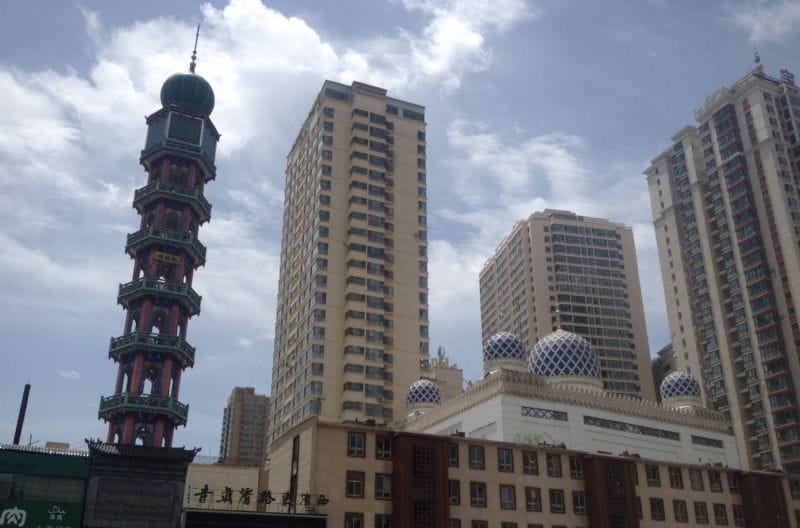 Here are two mosques from the Muslim Quarter, one in Chinese style and the other in “traditional” Arab form.
Here are two mosques from the Muslim Quarter, one in Chinese style and the other in “traditional” Arab form.
This is true. It’s hard to distinguish a Hui from a Han Chinese (unless they are wearing white caps or veils), and they also happen to primarily reside right in the heart of China. However, my question turned out to be prescient.
Unbeknownst to me at the time, the Communist government had already put in motion a plan to restrict the Hui Muslims in much the same way as the Uyghurs. NPR has reported that in April of 2018 (just a month before I was deported) the Hui “exemption from the harshest of religious restrictions changed..when the Chinese Communist Party’s United Front Work Department formally took control of the State Bureau of Religious Affairs.”
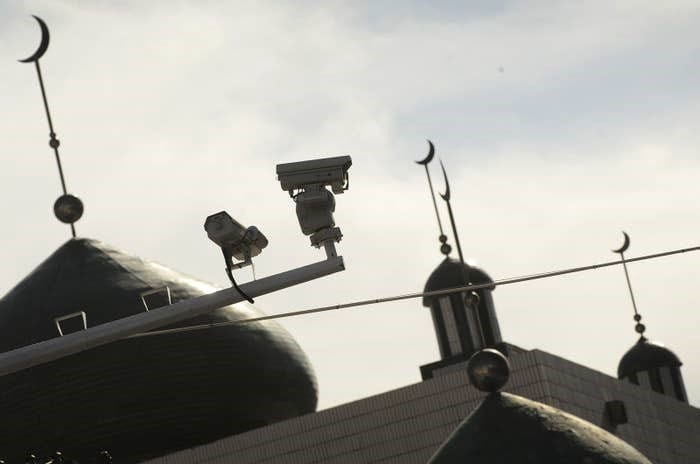 Chinese surveillance is targeting all religions, except the worship of the Communist state.
Chinese surveillance is targeting all religions, except the worship of the Communist state.
It is interesting that this same “change” in religious restrictions was also true of Christians, and may have led to my own arrest. As I was to find out later, it was the same “Bureau of Religious Affairs” (mentioned above) who actually tracked me down and undertook much of my interrogation.
So if I was back in that police car today, I would ask a different question:
“Why does Communism treat angry Uygurs, Chinese Hui, and loving Christians all the same, when their lives bear such different fruit?”
An honest answer would reveal that each of these are a threat to the fragile psych of the Communist leaders, who fear losing control of their subjects.
Going Away Gift
It was not a long drive from our apartment to the train station, and we arrived before I could think of any other questions. The driver (who was, coincidentally, Officer Barney Fife from Part III) helped pull my bags out from the trunk of his police car. (I had a large suitcase, a carry-on, and a backpack.)
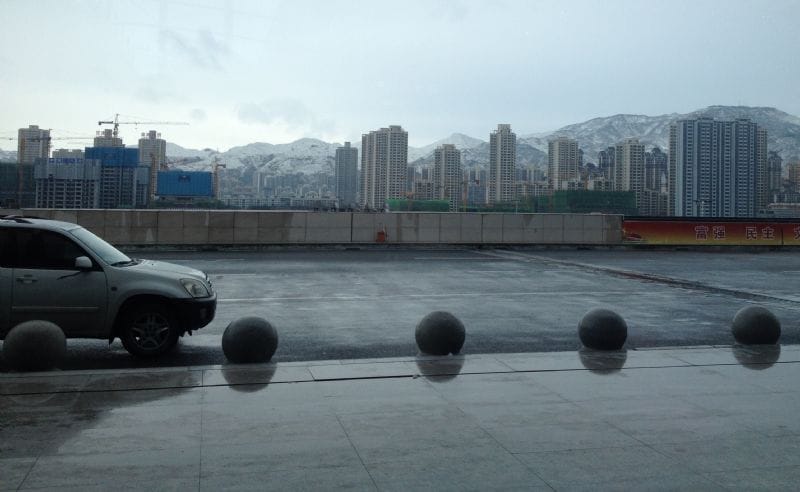 This is where we unloaded (taken the year before). I didn’t risk using my phone (camera) at all on my Deportation Day.
This is where we unloaded (taken the year before). I didn’t risk using my phone (camera) at all on my Deportation Day.
Before we could move towards the entrance, “Barney” hesitated and then called for me to stop. He then reached back into the trunk and pulled out a pretty red tie:
“Here is a going away gift for you! It’s really nice. Do you like this one?”
Chuckling quietly, I thought to myself: “Only in China.”
Believe it or not, he seemed sincere. It was almost like he was trying to show that he didn’t have anything against me personally, but that he was just doing his job. I thanked him for the tie, shook his hand, and said goodbye.
The More the Merrier
I continued on into the station with the other two officers and was briefly given my passport (which I hadn’t seen in almost four weeks), but just to pass through train station security. Then I had to give it back. We wandered into the large station hall and took some seats near the middle, with plenty of time to spare before the train was scheduled to depart.
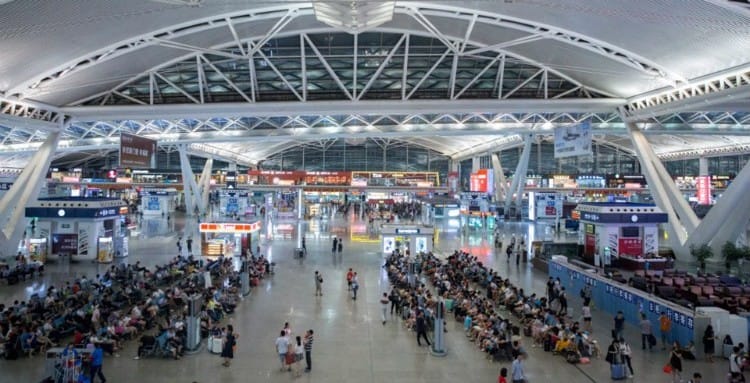 Like most of the pics in this post, it was taken on a different occasion, but is representative of the moment.
Like most of the pics in this post, it was taken on a different occasion, but is representative of the moment.
After a few minutes, the head officer (Richard), greeted two other guys who strolled up, toting small overnight bags. At first I thought they were just random friends that he happened to run into, but then they were introduced to me as two more escorts, this time from the Bureau of Religious Affairs. (Richard and his partner were from Foreign Affairs.)
“Yippee”, I thought. “The more the merrier.”
I guess they considered me some sort of a “flight risk” since they had me outnumbered 4 to 1. But where was I gonna run off to without a passport?
The McDonald’s Dare
In order for this next section to make sense, I need to explain two things:
First, I was carrying some very sensitive documents and data in my luggage that day. I had some personal paperwork, a couple of hard drives and thumb drives, not to mention my laptop, that I needed to carry with me out of China. A thorough search of this data would have revealed mountains of info about past teams and ministry plans, not to mention the names of friends and co-workers. So I had all of these things buried and hidden deep inside my bags, hoping that they wouldn’t pick today to search through my personal stuff for the first time.
Second, McDonalds was fairly new to our city at the time. We only got our first one just a year or two before, so anytime I got near one I had the urge to go and get a snack. Just a cheeseburger. Or maybe some fries.
So what’s the point, you ask? Well, as I was sitting there chillin’ with these four officers, I couldn’t help but notice a McDonald’s over in one corner of the station. And I thought to myself: “I wonder if they will let me go grab a burger?” It didn’t hurt to ask, and sure enough, I was indeed given permission to “buy a burger, and then come right back”.
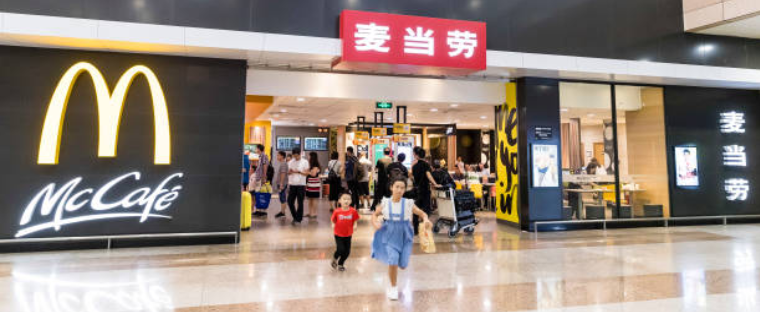 McDonalds is pronounced “Mai-dang-lao” in Chinese.
McDonalds is pronounced “Mai-dang-lao” in Chinese.
But then I had to make a quick decision about my bags. If I insisted on taking them with me to McDonalds, it would probably look suspicious, like I was hiding something. But if I just left them there with the police, while I was hundreds of yards away out of sight…
At that moment, I made the calculated decision that a search would be less likely if I was willing to trust my unprotected bags into their care.
“Keep an eye on my stuff, please.” I casually asked the officer sitting next to me. “I’ll be back in a few minutes.”
I remember the awkward feeling walking to McDonalds, knowing that all my personal belongings were literally within their reach. Yet I felt confident that my plan would work. I gave them “face” by daring to trust them. I hoped they would return the favor.
While ordering my burger, I noticed that the youngest officer had been sent over to “keep an eye” on me. I got my food, and together we strolled back to the waiting area. A quick glance reassured me that my luggage indeed remained untouched. The “dare” seemed to have worked.
Surprise, Surprise
Before I had a chance to eat, however, everyone suddenly stood up and began to gather their things.
“Where are we going?” I queried, throwing on my backpack.
“We’re going to the train station security office,” replied Richard, the head Foreign Affairs officer.
“Oh, good grief,” I thought to myself. “They really were planning to search my bags all along!”
I dutifully followed along, bags in tow, praying under my breath and hoping that they weren’t really planning to search my things.
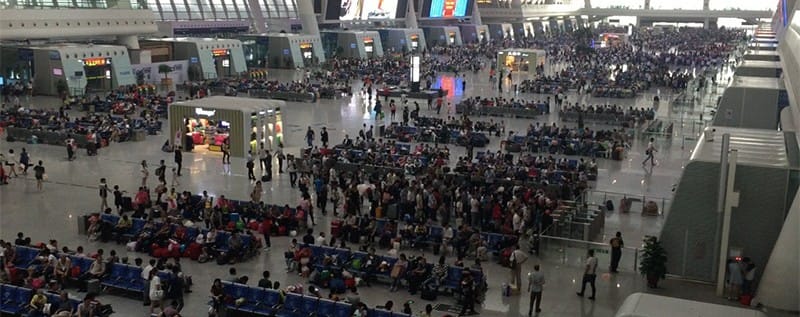 China’s newer railway stations are large, so it was a pretty good hike back to the front.
China’s newer railway stations are large, so it was a pretty good hike back to the front.
When we got near the front of the large Departure Hall, we were met by some station security staff who led us through a side door and into an office with a long wooden boardroom-style table. I was directed to a spot on the left side of the far end of the table, across from Richard. My luggage remained near the door.
As we stood there facing one another, with more than a half dozen police and security staff watching, Richard pulled a piece of paper out of a notebook and told me to pay attention. He then began to read aloud from a document which I quickly recognized to be the official verdict or “decision” that had been determined by the Communist powers that be.
It was surreal as I listened to him read the one page document. It wasn’t written in an overly formal style, but did begin with an introduction that included my full name, birth date, nationality, and passport number. Once that was all out of the way, however, there was really only one section of the letter that stood out to me. Everything else faded into the background.
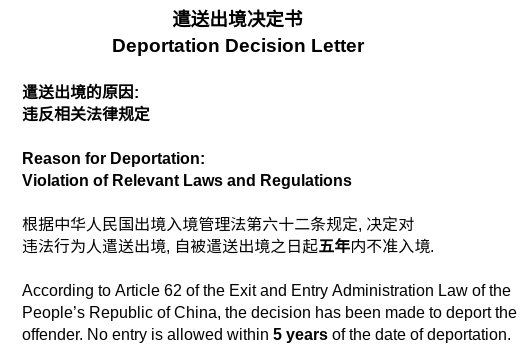
Five years. FIVE YEARS! Up until that moment, I had not been told if I was being forced out of China for a year, ten years, or even FOREVER. I had no idea. I had been hoping for the best, but preparing my heart for the worst.
Time seemed to slow down as Richard handed me a copy of the letter and asked me to sign at the bottom, right beside the five Chinese characters that make up the one English word: “offender”.
Final Appeal
I was given a copy to keep and then we all began exiting the “boardroom” for our old seats in the Departure Hall. Before leaving the room, however, I took another look at the letter and something jumped out at me:

With a grin on my face, I looked over at Richard and asked jokingly:
“How would I be able to appeal this decision within 60 days if I am being kicked out today?”
“Uh. Maybe your wife could do it for you?” he replied, unsure of himself.
He obviously wasn’t expecting the question. But it really wasn’t a “serious” question on my part. Even if the Chinese appeals system wasn’t a total joke, I still wouldn’t want to take a chance on them finding out more about my former activities and giving me a harsher verdict!
Shedding Tears
As I started walking back towards our old seats, my (unsearched!) bags in tow, I began to get teary eyed. Those closest to me know that I rarely cry, but I suddenly became overwhelmed with a sense of relief and thankfulness to God for my “punishment”.
I didn’t realize until that moment how much I had bottled up the emotions of possibly being banned for ten years or longer. So my tears were tears of joy, not sadness.
“Wow, only five years,” I thought to myself.
“Five years will fly by!”
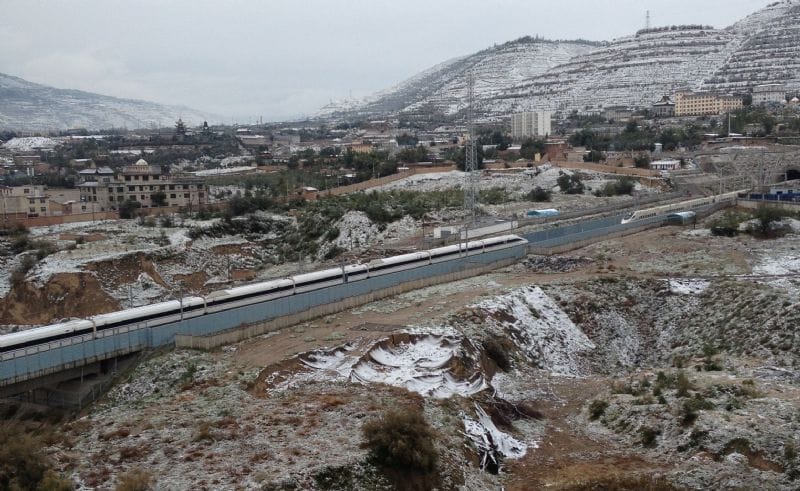 I miss this view! From my old bedroom window, I could watch the bullet trains zoom by on their way out of town.
I miss this view! From my old bedroom window, I could watch the bullet trains zoom by on their way out of town.
Bullet Trains Fly Too
Finally the time came to board the train. Just a few years earlier this trip would have been entirely different. The old train used to take all day (or all night), but the new bullet train more than cuts the trip in half (from 8 hours down to 3), mostly by knifing straight through the rugged terrain. It’s not an exaggeration to say that most of this particular journey is spent zooming in and out of the countless tunnels.
I don’t remember how our seats were chosen, but somehow I ended up next to Richard, the head of the Visa Office of our city, and the guy who seemed to be in charge of my deportation expedition. I remembered seeing him off and on over the years whenever we would apply for visa renewals (he had been on the job for 20 years). He also had a part in my interrogation the month before, as well as my “processing” (finger-printing, picture-taking) during the previous few weeks.
Picking the Policeman’s Brain
As the train took off, quickly passing within a stone’s throw of my (now former) home and then entering the first of hundreds of tunnels, Richard seemed a bit more relaxed than usual. He began to ask me questions about pronouncing certain English words, and I did my best to help him out. Turns out he likes trying to read foreign news on his iPhone, although the news outlets he mentioned are supposed to be blocked in China. Police privilege, I guess.
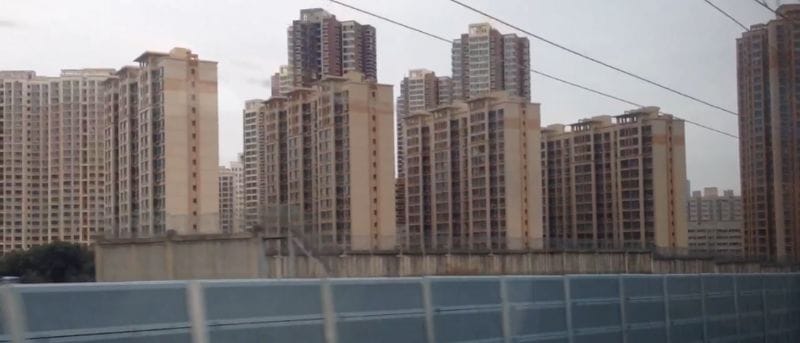 This is the “mirror” view of the picture above taken from my bedroom. Our old building is the second from the right (of the middle four).
This is the “mirror” view of the picture above taken from my bedroom. Our old building is the second from the right (of the middle four).
I’ve never really enjoyed teaching English, but I smiled to myself as I pondered the fact that the man next to me was in charge of giving (or revoking) all of the visas for all the foreigners in our region. In light of this, one of the first questions it dawned on me to ask him was:
“What should we foreigners do when Chinese people offer to pay us to teach English to their children, or to themselves?”
In China, someone on a student visa or a tourist visa is not permitted to work, and even someone with a work visa is technically only supposed to work for their employer, not anyone else. His response?
“It’s ok for foreigners to teach friends and neighbors unofficially, so long as it’s not their ‘main thing’ or ‘primary purpose’ for being there.”
Makes sense. Feel free to teach English on the side, for fun or for some extra cash, but don’t pretend to be a student or a tourist and then make teaching your full-time job.
He even joked (and I kind of hope he wasn’t joking!) that…
“If you visit again someday, come teach English at the police department.”
That was actually a comforting thing (to me) for him to say. He wasn’t mocking me, but seemed to consider my return a real possibility. Now, I’ll take all the encouragement I can get, but when I do return, I know I probably won’t be volunteering to hang out with the police.
As our train continued to speed through the mountains, I figured this was as good a time as any to try and get a bit of “inside info” into the official affairs of the strategic city that we had called home for so long, and where many of our friends and colleagues still remained.
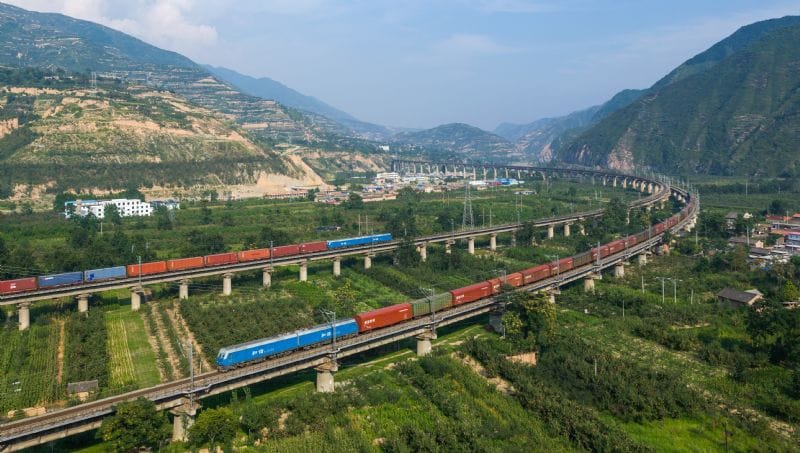 The sheer number of tunnels only allows for brief (and glorious) glimpses of the scenery.
The sheer number of tunnels only allows for brief (and glorious) glimpses of the scenery.
Naming Names
I don’t remember who started it, but at one point we began exchanging names of people we both knew (or didn’t know). I was obviously glad that he didn’t seem to know about any of our closest friends, or the people on our team (that would have made me very nervous!), but we knew enough of the same friendly faces who had been around for years that it helped to keep the conversation going.
I must’ve dared to ask him something along the lines of:
“Has anyone else gotten in trouble for doing something like what I did?”
Richard remembered a young man and an older gentleman who were both arrested about eight years before, after having covered one of the small cities in his region with tracts. He seemed amused when recalling the incident, and I was too! But I couldn’t let on that I was long-time friends of that particular teenage boy and his older teammate, and had been the one to make all the plans for their trip!
“Oh, really?” was about all I could muster. “Interesting. What city was that?”
I knew full well what city it was, as I had been back myself many times.
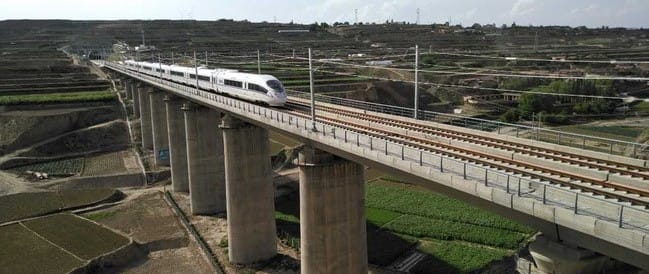
More Than I Thought
As the journey continued, I changed the subject, asking him a question I myself have been asked numerous times over the years:
“How many foreigners live in the city?”
I had always answered that it must be in the “high” hundreds, so I was surprised when he said that there were about 2,000 registered foreigners in the region. I assume that these are mostly foreign exchange students from all over Asia, Africa, and even the Middle East, the majority of whom we only occasionally run into or pass by on the street. In contrast, the number of Christian missionaries is almost definitely in the low hundreds.
I was also interested to find out that 40,000 tourists pass through the city in an average year. The true number is probably a bit higher, because the police only count those who are officially “registered” at local hotels, and some foreigners (cough, cough) avoid those kinds of hotels as much as possible by staying only in private lodging or quickly continuing on to other “suitable” locations.
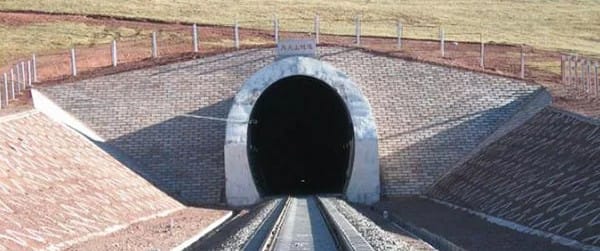
Finally, Some Useful Intel
Remember, I had four escorts for my deportation journey: two from the Foreign Affairs Police and two from the Religious Affairs Bureau (which had just been brought directly under Communist Party control). At some point in the evening, between napping, eating a cold Big Mac, and nabbing glimpses of the glorious green mountains out my window, Richard explained to me why the “other guys” from Religious Affairs had insisted on coming along.
It turns out that they were the ones who had actually done the footwork (surveillance video work, actually) which enabled the police to track me down, and they considered themselves an integral part of the process. That sounds reasonable enough. Or, maybe they just wanted an excuse for a mini-vacation, paid for by headquarters.
But what made this seemingly innocuous info so helpful to me was that it let me know who we are really up against as we continue to send teams to spread the Gospel in this unreached corner of China. By knowing the jurisdiction limits of the bureau that caught me, I could make safer plans for future teams by purposefully avoiding areas that fall inside their purview.
And this is exactly what we’ve done for more than two years now. We know who is persistent enough to track us down using the available technology, and we can avoid their areas entirely and focus on even more remote towns, or we can take extra precautions when in these same areas.
So far, both of these strategies have been working. But the Wuhan Flu (I’m sticking to the original name) is going to make surveillance tighter than ever, and more difficult to overcome. Pray for me, and for our teams, that God would close the eyes of the enemies of the cross, and open the eyes of blind sinners who desperately need for Jesus to save them!
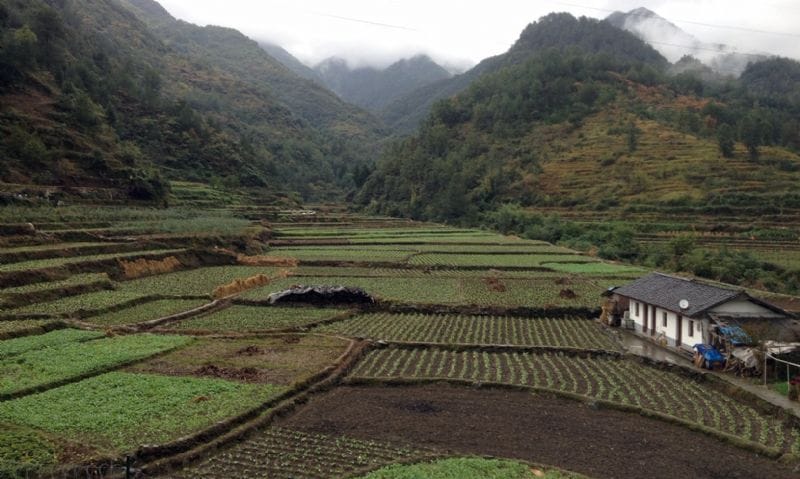 This was taken from a different train (while the it was stopped). The bullet train is too fast for good pics.
This was taken from a different train (while the it was stopped). The bullet train is too fast for good pics.
Where’s the Police Privilege?
As we approached our destination, I had to convince the police that it was best if we got off one station early, because it was quicker and cheaper to get to the international airport from there. They took my word for it, and we exited the railway station into a mass of official taxis (private cars pretending to be taxis).
I had assumed that finding an honest taxi driver would be easier for four policemen than for the average joe foreigner, but I guess I was mistaken. They argued with drivers and debated the prices, all while I stood back thinking that I probably should’ve been in charge. Anyone who had been here before knew that the price was about 20 RMB per person to get to the airport. They finally figured out the price (well, sort of) but realized that one taxi was not going to be big enough for all six of us (four police, myself, plus the driver, not to mention my bags), so they picked out two different taxis and we loaded up.
However, as we made our way to the airport the Religious Affairs officer in my taxi was not happy when the driver informed him that they would have to pay 20 RMB for each seat (four), even though there were only three of us in the taxi (and two in the other taxi). The 20 RMB per person price was based on having four passengers in each car. I understood this perfectly, having done this exact same trip multiple times. It was kind of funny to see the police accuse the driver of “taking them for a ride” and bicker with him all the way to the terminal. Eventually, they grudgingly paid each driver the full 80 RMB, and off they went. I was sort of impressed that they never pulled the “police card” and insisted on paying whatever price they wanted.
Hurry Up and Wait
I led my escort squad to the correct check-in area at the far right side of the large departure hall, but it was still a little too early to check in. So they stood around chatting for a bit about where they would stay and eat dinner after my departure, while I stood at the front of the line at the check-in counter, ready to finally get through security and be free from my baby-sitters. It had been nearly seven hours since they picked me up at my house late in the afternoon!
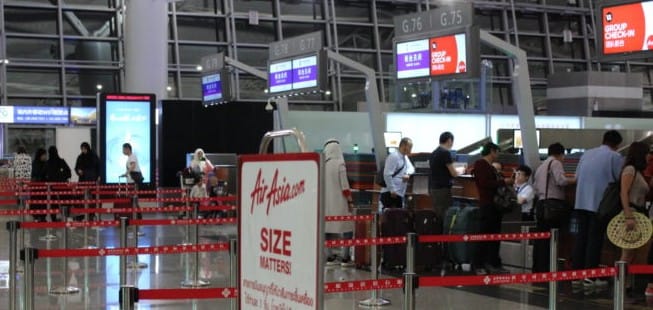
Awkward Goodbye
When the counter opened, I was handed my passport once again. But it was short-lived! As soon as check-in was completed, I had to give the passport back as we walked over to the security entrance, where I hoped to finally say goodbye.
It was a bit of an awkward moment, to be honest, saying goodbye to the police who were deporting me. Usually, these emotional moments are reserved for close friends and family who you might not see for quite some time. With the police, it was almost the opposite feeling; relief that you wouldn’t have to deal with these guys again for a very long time (hopefully, never). However, Richard and I had chatted enough to become at least superficially friendly, so I could genuinely shake his hand and say ‘adios, amigo’.
The last thing they did, before finally giving me back my passport for keeps, was to take turns snapping pictures with me. I think it was something they had to do as proof that they had taken me as far as they could (the Departure Gate signs were clearly visible behind me), but nevertheless they smiled and gave the peace sign as if they were college students sending off a friend. Awkward, like I said.
Finally Free?
Once I walked into the secure area, I never looked back. I felt a wave of relief come over me as I looked forward to an hour or two alone in the airport terminal, followed by an overnight flight to Kuala Lumpur.

But no sooner had I sat down in the terminal when my phone began to ring. It was my wife, but she told me that the police were calling her asking for me, wondering if I had made it through security ok.
“Good grief,” I thought. “They still think I’m gonna try to make a run for it?”
I told my wife to just tell them I was fine and that I had left that phone and SIM card with her, since I didn’t have any use for it outside of China. I did still have my personal iPhone with me, but it had been turned off and hidden away in my bags all day long, since it would’ve been weird for the police to see me using it after all the effort they had made to extract my passcode from me during the interrogation.
So the police had no way to contact me directly since we’d said goodbye in the Departure Hall. Perfect. Fine by me. I had already gotten my passport stamped. I wasn’t going anywhere except Malaysia.
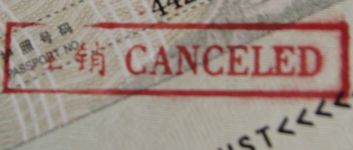 By the way, the look on the passport control girl’s face when she saw the “Canceled” stamp on my visa was priceless. She looked up at me as if to inquire:
By the way, the look on the passport control girl’s face when she saw the “Canceled” stamp on my visa was priceless. She looked up at me as if to inquire:
“What did you do?”.
I just smiled and said “Mei shi (No Big Deal).”
Home Away from Home
We’ve visited Malaysia numerous times over the years and have many friends and co-laborers in the Gospel there. But this was different. Instead of a short trip, and a return to our home in China, Malaysia would be my main hub for the next 5-6 months, as we traveled around Asia, sharing the Gospel and praying about what the Lord would have us do next.
After getting settled in my little hotel room in Kuala Lumpur the following morning, I remember laying out almost everything I had brought (including lots of books and maps) in neat little stacks and piles all over the room. It had all made it safely out of China, but most of these things wouldn’t be necessary for me to lug around during my upcoming travels.
In just a few short days, I would leave for Myanmar (where I would follow in the footsteps of Adoniram Judson), Macau (have secret meetings in a casino), Thailand (reunite with my family), Malaysia (meet with teammates from China) , India (explore Darjeeling with my son) and Nepal (suffer for Jesus as a family).
So it was time to re-organize and re-pack and figure out what to leave behind with friends in Kuala Lumpur, so I could begin my next adventure in Yangon the following week with a lot less luggage…and a lot more freedom.
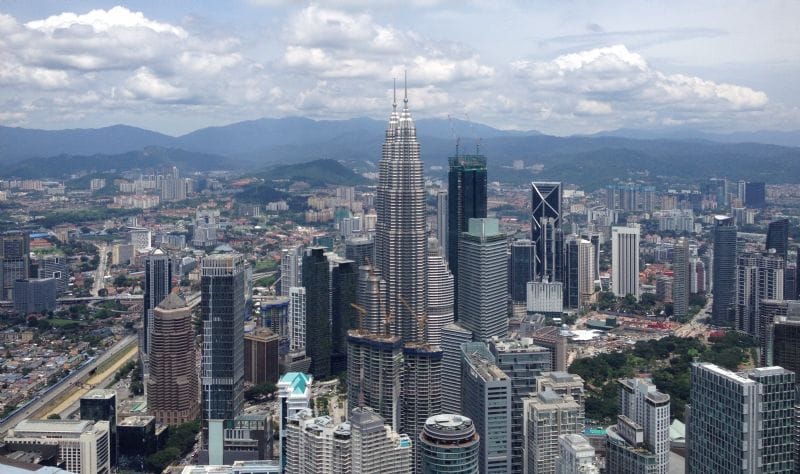 The Petronas (Twin) Towers taken from near the top of the KL Tower (October, 2017).
The Petronas (Twin) Towers taken from near the top of the KL Tower (October, 2017).
—————————————————————————————–
Please continue to pray for us, and consider supporting our long-term missionaries who are still serving faithfully in China. You are also invited to join a future short-term ministry team! Feel free to write anytime.









Praising Jesus for your great travel log info helps me to know how to pray
Sorry I wasn’t able to see you when you visited friendships thanks for the book may God bless and protect you and family Teams be successful and protected